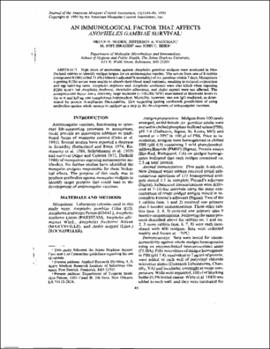| dc.contributor.author | Noden, Bruce H. | |
| dc.contributor.author | Vaughan, Jefferson A. | |
| dc.contributor.author | Ibrahim, M. Sofi | |
| dc.contributor.author | Beier, John C. | |
| dc.date.accessioned | 2022-04-12T13:29:21Z | |
| dc.date.available | 2022-04-12T13:29:21Z | |
| dc.date.issued | 1995 | |
| dc.identifier | oksd_noden_immunologicalfactor_1995 | |
| dc.identifier.citation | Noden, B. H., Vaughan, J. A., Ibrahim, M. S., & Beier, J. C. (1995). An immunological factor that affects Anopheles gambiae survival. Journal of the American Mosquito Control Association, 11(1), pp. 45-49. | |
| dc.identifier.uri | https://hdl.handle.net/11244/335132 | |
| dc.description.abstract | High titers of antibodies against Anopheles gambiae midguts were produced in New Zealand rabbits to identify midgut targets for an antimosquito vaccine. The serum from one of 8 rabbits (designated R2B6) killed 71.6% (Abbott's adjusted % mortality) of An. gambiae within 7 days. Mosquitoes ingesting R2B6 serum were unable to absorb their blood meal nutrients, resulting in reduced oviposition and egg hatching rates. Anopheles stephensi and Anopheles arabiensis were also killed when ingesting R2B6 serum but Anopheles freeborni, Anopheles albimanus, and Aedes aegypti were not affected. The mosquitocidal factor was a relatively large molecule (> 100,000 MW) maintained at threshold levels in the sera and killing was complement independent. Mortality, however, was not IgG mediated, as determined by protein A-sepharose fractionation. This surprising finding confounds possibilities of using antibodies against whole mosquito midguts as a step in the development of antimosquito vaccines. | |
| dc.format | application/pdf | |
| dc.language | en_US | |
| dc.publisher | The American Mosquito Control Association | |
| dc.relation.ispartof | Journal of the American Mosquito Control Association, 11 (1) | |
| dc.relation.uri | https://www.ncbi.nlm.nih.gov/pubmed/7616189 | |
| dc.rights | This material has been previously published. In the Oklahoma State University Library's institutional repository this version is made available through the open access principles and the terms of agreement/consent between the author(s) and the publisher. The permission policy on the use, reproduction or distribution of the material falls under fair use for educational, scholarship, and research purposes. Contact Digital Resources and Discovery Services at lib-dls@okstate.edu or 405-744-9161 for further information. | |
| dc.subject.mesh | Aedes | |
| dc.subject.mesh | Animals | |
| dc.subject.mesh | Anopheles | |
| dc.subject.mesh | Antibodies | |
| dc.subject.mesh | Digestive System | |
| dc.subject.mesh | Female | |
| dc.subject.mesh | Immunoglobulin G | |
| dc.subject.mesh | Male | |
| dc.subject.mesh | Mosquito Control | |
| dc.subject.mesh | Rabbits | |
| dc.subject.mesh | Vaccines | |
| dc.title | Immunological factor that affects Anopheles gambiae survival | |
| dc.date.updated | 2022-04-07T14:56:35Z | |
| osu.filename | oksd_noden_immunologicalfactor_1995.pdf | |
| dc.description.peerreview | Peer reviewed | |
| dc.description.department | Entomology and Plant Pathology | |
| dc.type.genre | Article | |
| dc.type.material | Text | |
| dc.subject.keywords | Immunization | |
| dc.subject.keywords | Infectious Diseases | |
| dc.subject.keywords | Vector-Borne Diseases | |
| dc.subject.keywords | Rare Diseases | |
| dc.subject.keywords | Infection | |
| dc.subject.keywords | 3 Good Health and Well Being | |
| dc.subject.keywords | 0608 Zoology | |
| dc.subject.keywords | 1117 Public Health and Health Services | |
| dc.subject.keywords | Tropical Medicine | |
| dc.identifier.author | ORCID: 0000-0002-0096-370X (Noden, BH) | |
| dc.identifier.author | ScopusID: 6601968347 (Noden, BH) | |
| dc.identifier.author | ScopusID: 7202772214 (Vaughan, JA) | |
| dc.identifier.author | ScopusID: 7402468632 (Ibrahim, MS) | |
| dc.identifier.author | ScopusID: 7102003162 (Beier, JC) | |
